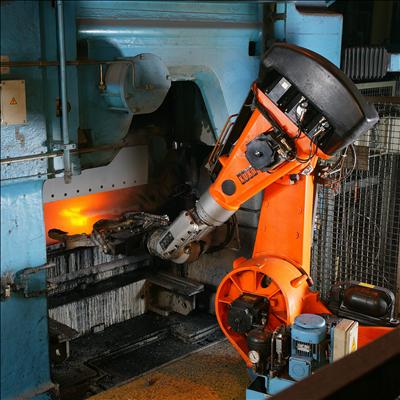Types of Robot
This is the second assignment
1. Humanoid Robot
A humanoid robot is a robot with its body shape built to resemble that of the human body.
A humanoid design might be for functional purposes, such as interacting
with human tools and environments, for experimental purposes, such as
the study of bipedal locomotion, or for other purposes. In general,
humanoid robots have a torso, a head, two arms, and two legs, though
some forms of humanoid robots may model only part of the body, for
example, from the waist up. Some humanoid robots may also have heads
designed to replicate human facial features such as eyes and mouths. Androids are humanoid robots built to aesthetically resemble humans.
2. Animaloid Robot
 An animaloid robot is a robot with shape built to resemble of animal. For example is the AIBO robot. Animaloid
companion robots represent a very interesting paradigm. An increasing
number of studies on this topic has been carried out in the past,
involving such robots and older users affected by some kind of cognitive
disease, from mild cognitive impairment (MCI) to more severe stages of
Alzheimer's disease and other types of dementia. In the study described
in this paper, an AIBO robotic dog was programmed and used to show
simple reactive behaviors during the interaction with old adults.
Experimental sessions were carried out with a group of 24 older subjects
with cognitive deficits of relatively small entity (MMSE>23).
Preliminary results seem to show the acceptability of this approach
especially in subjects with a good relationship with technology. In the
next future, the interaction between the robot and the old adults will
be tested in more complex situations.
An animaloid robot is a robot with shape built to resemble of animal. For example is the AIBO robot. Animaloid
companion robots represent a very interesting paradigm. An increasing
number of studies on this topic has been carried out in the past,
involving such robots and older users affected by some kind of cognitive
disease, from mild cognitive impairment (MCI) to more severe stages of
Alzheimer's disease and other types of dementia. In the study described
in this paper, an AIBO robotic dog was programmed and used to show
simple reactive behaviors during the interaction with old adults.
Experimental sessions were carried out with a group of 24 older subjects
with cognitive deficits of relatively small entity (MMSE>23).
Preliminary results seem to show the acceptability of this approach
especially in subjects with a good relationship with technology. In the
next future, the interaction between the robot and the old adults will
be tested in more complex situations.
3. Industry Robot
 An industrial robot is defined by ISO as an automatically controlled, reprogrammable, multipurpose manipulator programmable in three or more axes. The field of robotics may be more practically defined as the study, design and use of robot systems for manufacturing (a top-level definition relying on the prior definition of robot).
An industrial robot is defined by ISO as an automatically controlled, reprogrammable, multipurpose manipulator programmable in three or more axes. The field of robotics may be more practically defined as the study, design and use of robot systems for manufacturing (a top-level definition relying on the prior definition of robot).
4. Robot Riset / Robot for Research
 This robot is especially made for research. For example, the Mars Rover. A Mars rover is an automated motor vehicle which propels itself across the surface of the planet Mars upon arrival.
This robot is especially made for research. For example, the Mars Rover. A Mars rover is an automated motor vehicle which propels itself across the surface of the planet Mars upon arrival.
Rovers have
several advantages over stationary landers: they examine more
territory, they can be directed to interesting features, they can place
themselves in sunny positions to weather winter months and they can
advance the knowledge of how to perform very remote robotic vehicle
control.
There
have been four successful robotically operated Mars rovers. The Jet
Propulsion Laboratory managed the Mars Pathfinder mission and its now
inactive Sojourner rover. It currently manages the Mars Exploration
Rover mission's active Opportunity rover and inactive Spirit, and, as
part of the Mars Science Laboratory mission, the Curiosity rover.
5. Line Follower
Source: http://notesofmylifejourney.blogspot.com/2013_08_01_archive.html

Tidak ada komentar:
Posting Komentar